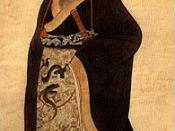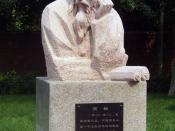Confucianism, Legalism, and Daoism
Confucianism, Legalism, and Daoism are the three main philosophies of the Chinese people. They have been the most influential and widely taught philosophies of the Chinese for many centuries. This essay will reveal the history of each philosophy's origin, and will reveal the main characteristics of each respected area.
Confucianism began as the thoughts and ideas of a man named Confucius who lived at around 500 B.C. It is interesting to note this was around the same time Buddha was supposedly alive. Confucian was not a prophet, and had little to say about gods, death, or the afterlife. He developed instead three concepts of living that formed the basis of his philosophy. First, every person should accept an assigned role in society and perform the duties of that role. Second, the government should be virtuous. Finally, only well-educated and extremely virtuous officials should be appointed to run the government.
According to legend, Confucius worked as a minister in his native province of Shandong. It is said that in a less than a year, almost all crime was gone. However, after this it is said nearby emperors became jealous and forced him to retire. For the rest of his years he educated people on the ways of his teaching and stirred thought into the minds of many.
Daoism was thought to be founded by a man named Laozi that lived around 500 B.C. Daoism can be defined by its root word Dao meaning "Way of Nature". Laozi viewed Dao as the indescribable force that governed the universe and nature. Laozi believed that people should not strive for riches or power, but rather should try to bring themselves into harmony with Dao by being peacefully quieted, thoughtful, and humble. Unlike Confucius, Laozi shunned politics and advised...


